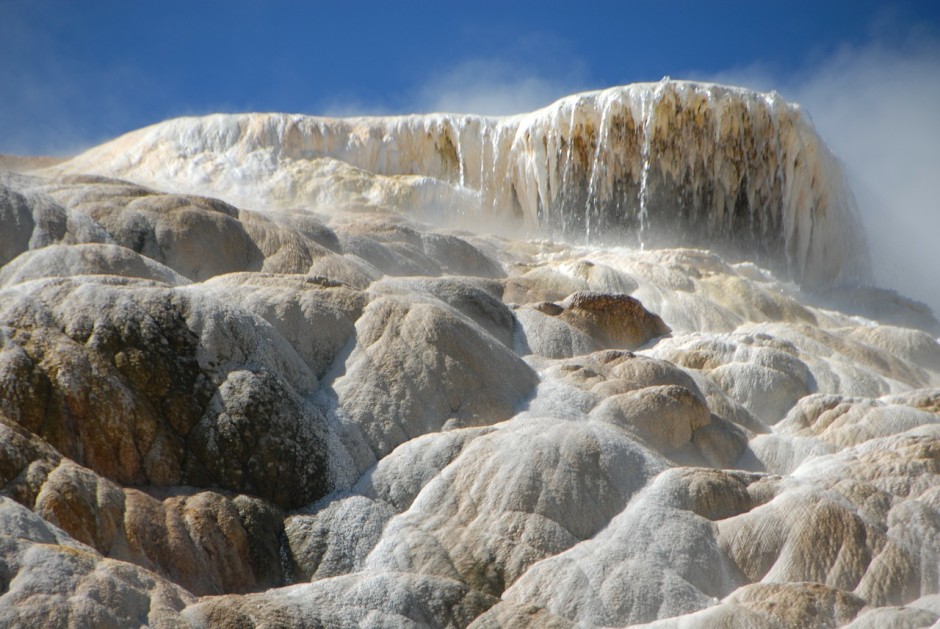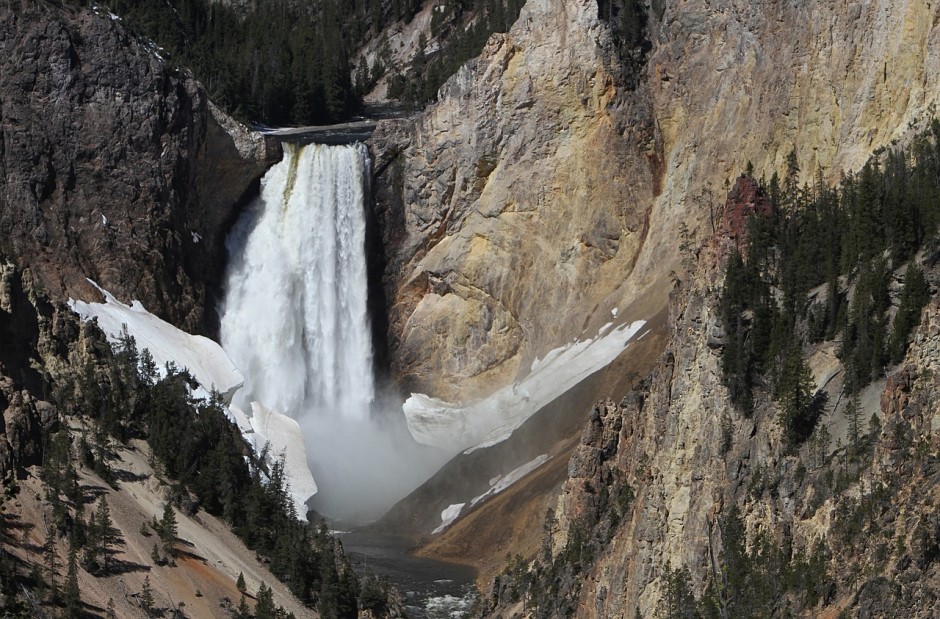This post is part of Just Ahead’s Yellowstone Trip Planner—our guide to what you need to know to plan your trip to Yellowstone National Park. Click here to see the complete series. And be sure to download our Just Ahead smartphone audio tour of Yellowstone before you head to the park.
Yellowstone is a massive national park, its 3,468 square miles teeming with geysers, grizzlies, and one gorgeous scene after another. Just Ahead’s smartphone audio tour guides travelers along famed Grand Loop Road in a giant figure eight through all of the the park’s many regions. But deciding where to go with limited time can be daunting. You could take several trips here and not see it all. Fortunately, we’re intimately familiar with every one of Yellowstone’s 310 miles of roadway and will tell you the sites you shouldn’t miss, plus a few lesser-known gems many visitors overlook.
Yellowstone’s Don’t-Miss Sights
Old Faithful Trails
Every Yellowstone visitor goes to Old Faithful, and sometimes it feels like all at once. We recommend escaping the crowds for a unique perspective on the area’s many thermal features at the Observation Point Trail, which offers a raven’s-eye view of the famed geyser and the Upper Geyser Basin. Printed guides for the Upper Geyser Basin trail system, including Observation Point, are available at the Old Faithful Visitor Center. You could easily spend an afternoon here touring some of the park’s most beautiful pools and watching geysers erupt.
Mammoth Hot Springs
Mammoth Hot Springs in the northwest corner of the park isn’t as world-famous as Old Faithful and its surrounding geyser basins, but it’s equally stunning. Raised boardwalks lead through steaming, pearly terraces that change shape and color every year like a living sculpture. The nearby village of Mammoth features a renovated visitor center inside historic Fort Yellowstone, a fascinating relic from the pre–National Park Service days when the US Army oversaw the park.

One of the pearly terraces of Mammoth Hot Springs
Yellowstone Lake
The drive between Lake Village and West Thumb leads along the shoreline of this massive mountain jewel of a lake, the largest high-elevation lake in North America. Just Ahead will point out the best places for lakeside lunches and short hikes, as well as a very cool side road that crosses a narrow sand bar with lake water on both sides.
Uncle Tom’s Trail
The Upper and Lower Falls in the Grand Canyon of the Yellowstone are among the park’s top highlights, and our favorite perspective on them is from Uncle Tom’s Trail. This one-of-kind, half-mile path descends 338 steps down the wall of the canyon to a platform where you can literally feel the thunderous power of Lower Falls.

Lower Falls of the Yellowstone River
Yellowstone Places We Love
Lamar Valley
The most remote region of the park accessible by vehicle gets skipped by many visitors, but there’s no better place to spot wolves and grizzly bears than the wild Lamar Valley near sunrise or sunset. Look for groups of dedicated wolf watchers peering through spotting scopes on the roadside. No matter what time of day you visit you’re sure to see a parade of wildlife and some of Yellowstone’s most spectacular scenery.
Norris Geyser Basin
The most dynamic geyser basin in Yellowstone, Norris is a fascinating place to spend a few hours strolling boardwalks through a kaleidoscope of colorful pools, bubbling mud pots, and ever-changing geysers. The boardwalks here have been relocated multiple times due to new thermal features erupting from the near- boiling-hot soil. Norris is home to Steamboat Geyser, tallest in the world, which has highly irregular eruptions up to 380 feet—three times as high as Old Faithful.
Mount Washburn
If you only have time for one day hike in Yellowstone, make it Mount Washburn. The approach road over 8,878-foot Dunraven Pass is the highest in the park and an adventure in its own right, but the five-mile round-trip hike from the pass up 10,243-foot Mount Washburn offers an unparalleled view of the park. Bighorn sheep and wildflowers are plentiful as you climb, and an active fire lookout at the summit features a spotting scope for surveying the world far below.
Yellowstone’s Overlooked Gems
Pelican Creek Nature Trail
One of our favorite short walks in the park is this 1.3-mile saunter near the Fishing Bridge area. It leads through old forest before emerging near the northern shore of Yellowstone Lake. The quiet beach here is a perfect place to watch sunset. Keep an eye out for waterfowl and otters as the trail loops back to the road along a boardwalk through the lush wetlands of Pelican Creek.
Sylvan Pass
To experience an alpine wilderness unique in Yellowstone, follow the park’s East Entrance Road up to 8,530-foot Sylvan Pass, where the glacially carved Absaroka Mountains claw at the sky. Even if you’re not heading all the way to Cody, Wyoming, 59 miles from the pass, it’s worth driving another seven miles east to the park boundary. The dramatic mountains here are striped with waterfalls in spring and carpeted with wildflowers in summer.
Yellowstone Association Courses
One of the best ways to enrich your visit to Yellowstone is to take a field course from the nonprofit Yellowstone Association. Available for individuals, groups, or families, these exciting courses get you out in some of the park’s best, and sometimes secret, spots with biologists, photographers, and expert naturalist guides. Most people who sign up call the experience the highlight of their Yellowstone trip. All proceeds go back to the park for educational and research programs.